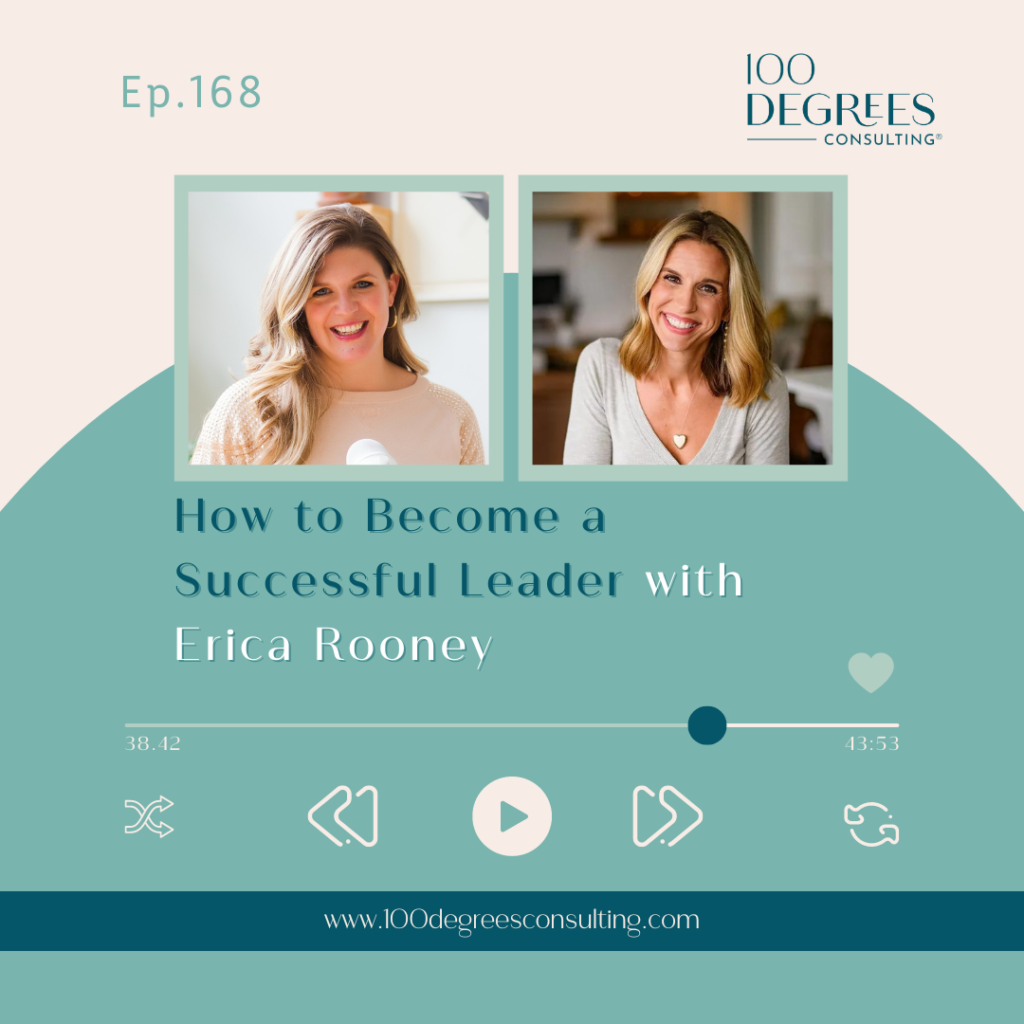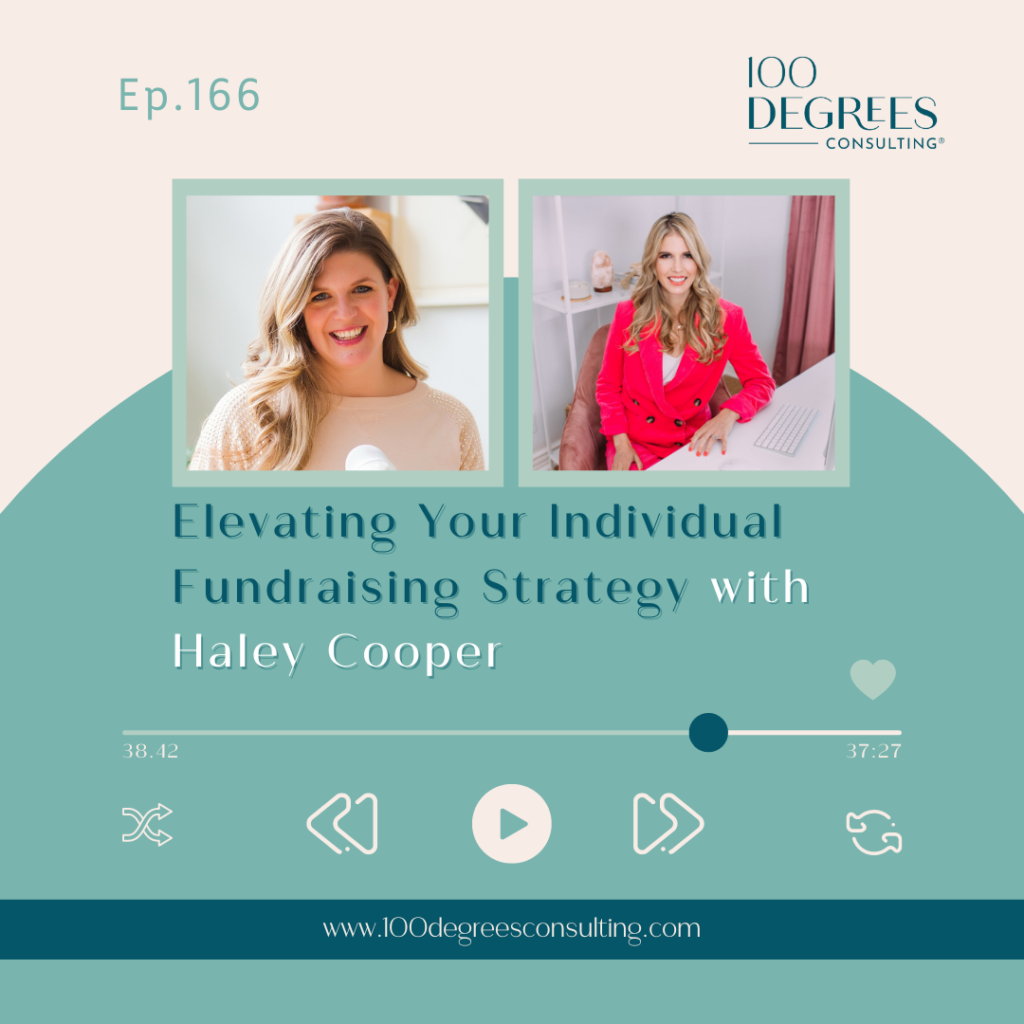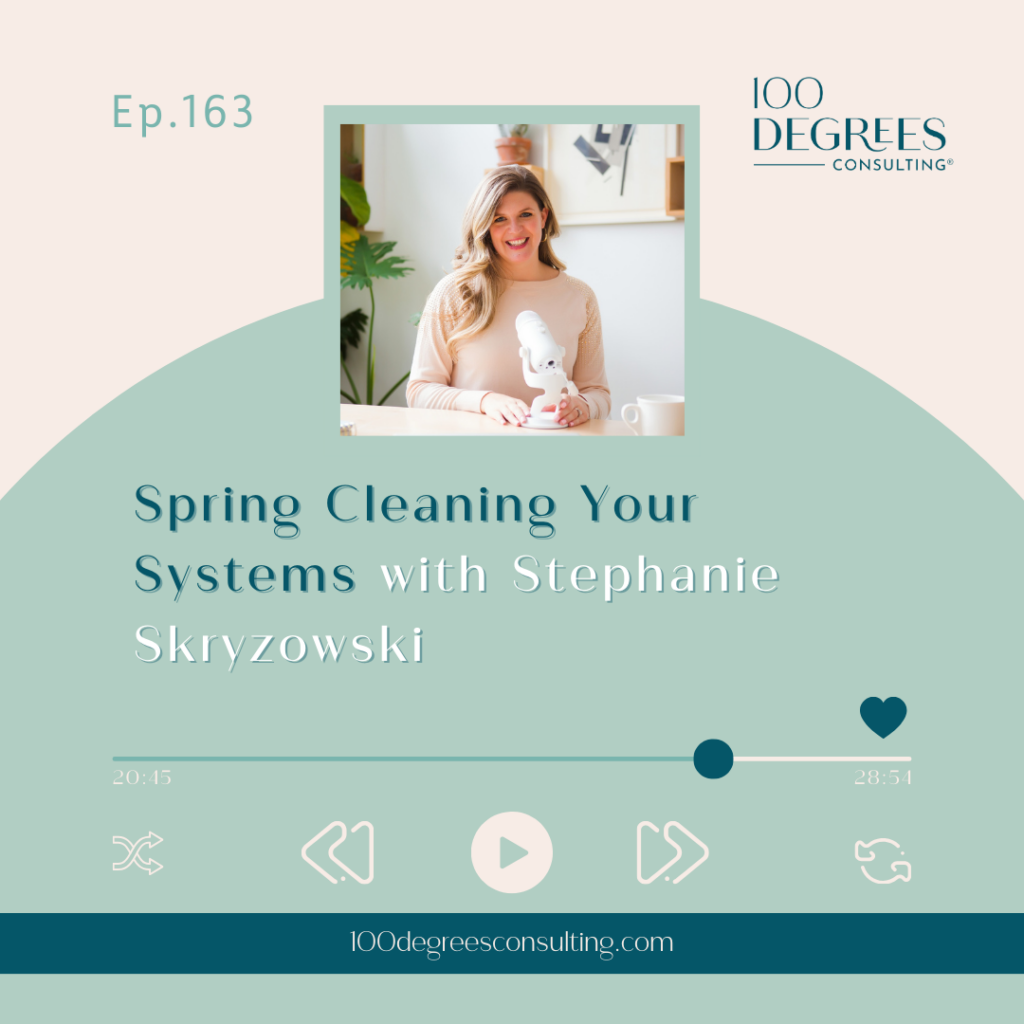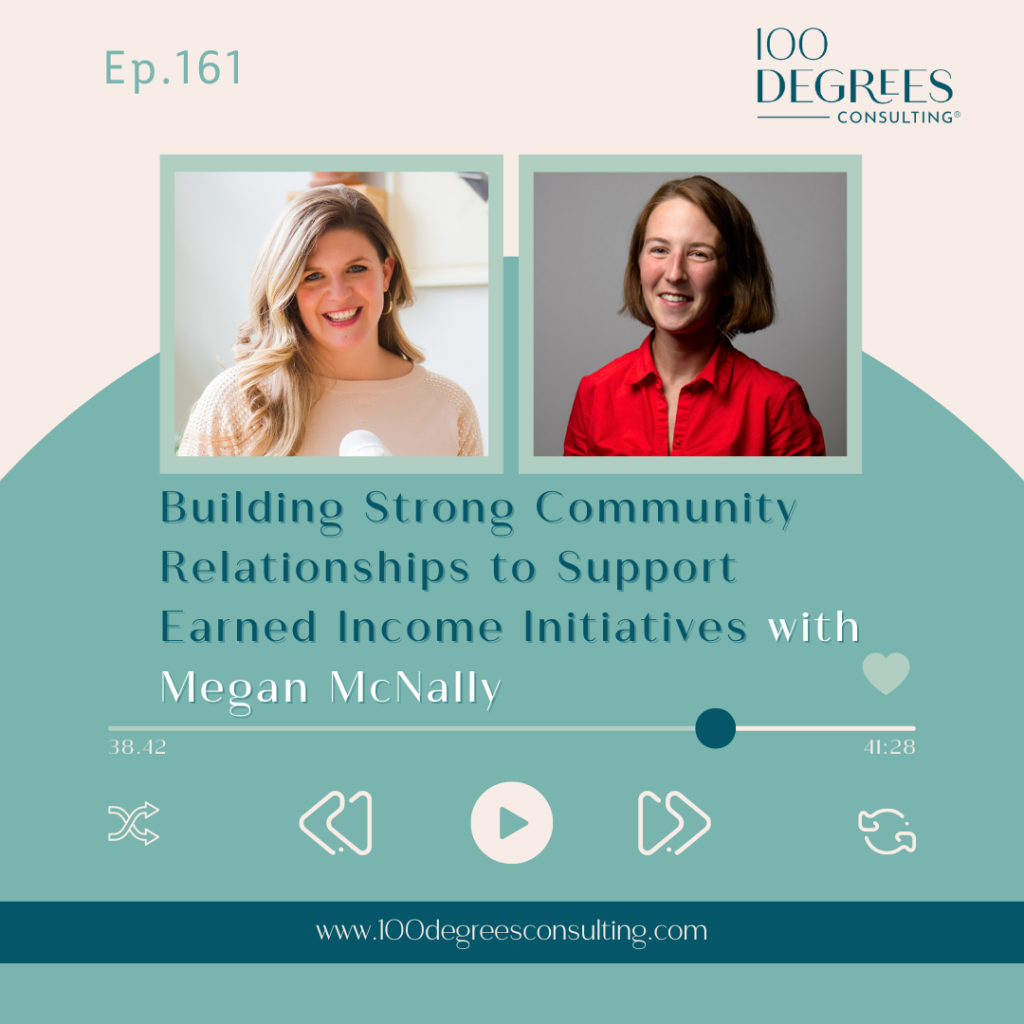Transcript Episode 168 – How to Become a Successful Leader with Erica Rooney on The Prosperous Nonprofit
[00:00:00] Stephanie Skryzowski: Welcome to the Prosperous Nonprofit, the podcast for leaders who are building financially sustainable and impactful nonprofits and changing the world. I’m Stephanie Skrzewski, a chief financial officer and founder and CEO of 100 Degrees Consulting. My personal mission is to empower leaders to better understand their numbers, to grow their impact and their income.On this show, we talk to people who are leading the nonprofit sector in new ways. disruptive and entrepreneurial ways, creating organizations that fuel their lives, their hearts and their communities. Let’s dive in.
Hello. Hello. Welcome back to the prosperous nonprofit. I am thrilled to be here today with Erica Rooney, who is. A friend of a friend. So I have a really good friend here in Buffalo where I live that we met through our [00:01:00] kids, like absolutely nothing to do with work. She is my bestie and then she introduced me to a good friend of hers who does not live in Buffalo.
Um, but Erica is who I’m talking to today and Erica and I just hit it off. We’re both, um, professional women, super driven. She works in the HR space. I work in the finance space and Erica is amazing. And so I was. So excited to get her on the podcast today. And we’re talking about all things, limiting beliefs, um, glass ceilings and sticky floors.
That is the name of Erica’s podcast and her book. And we talk all about women in leadership, what having it all looks like and how we can, you know, really bust through those glass ceilings and sticky floors. This was a fantastic conversation. So. Let me tell you a little bit about Erica and then we will dive into my call with her.
So Erica Rooney is a keynote speaker, executive coach and consultant, host of the podcast, [00:02:00] Glass Ceilings and Sticky Floors, and a chief people officer. With 15 years of experience in HR, leading organizations in gender equality crusades and coaching executive women, Erica has created a framework that empowers women to get seen, get heard, and get promoted by breaking free from the sticky floors, hold us.
back from busting through the glass ceiling. As a top culture expert, Erika invigorates and educates organizations through change, driving a positive experience for employees and guiding executives through the process of change to lead to massive success. She is on a mission to bring more women into positions of power and keep them there.
Her book, Glass Ceilings and Sticky Floors, shatter limiting beliefs and toxic behaviors to uncover even more. Infinite possibilities will be available for pre sale very soon. We’re going to link everything below in the show notes. Don’t you worry. So Erica lives in Wake Forest, North Carolina with her husband, Dan, and her two children, and her passions are running, reading, and cooking.
And she shares what time she [00:03:00] wakes up in the morning, all the things that she does, and how she does it. And that she actually gets eight hours of sleep every single night. So this is an amazing conversation. I left feeling so inspired to really just do more, do more. I don’t know if that’s what Erica was trying to inspire me to do.
Perhaps she was inspiring me to do a less and more strategic. But I just love this conversation. I, Erica is just so driven and I hope you feel, um, as inspired as I do as we dive into this episode. So without further ado, let’s go talk to Erica.
Hey everybody. Welcome back to the Prosperous Nonprofit. I’m so excited to have Erica Rooney with me on the show today. Erica, welcome. Yay, Stephanie. I’m so pumped to be here. Yes. Well, I’m so happy. We actually connected through a mutual friend, like totally not work related at all, but then [00:04:00] very quickly.
Well, I think our, our mutual friend knew that we had lots in common and I feel like we are just, yeah, we do have a lot in common and we share a lot of the same beliefs and the drive and all the things. And that’s why I’m so excited to chat with you today on the show. So why don’t you tell us a little bit about you and about what you do?
[00:04:19] Erica Rooney: Oh my goodness gracious. So by day, I love to like segment myself by day. I’m a chief people officer. I work for a company in tech and e commerce called Blue Apron ICI, and I’m responsible for all things employee experience. But then in all of the other hours of the day, I’m a wife. I’m a mom. I’m an author, a podcaster.I do executive coaching and keynote speaking. And yes, I do get eight hours of sleep. I always have to put that in there because everybody asks me. I love that. Do you sleep? Heck yes, I do.
[00:04:48] Stephanie Skryzowski: I love that. And you prioritize your own wellness because I know that you are a runner and you’re really into fitness.And I see you post in a real early in the morning that you’re up, you’re working out, you’re doing your thing, you’re taking [00:05:00] your walks. And so you fit that into, I love that.
[00:05:02] Erica Rooney: Sure do. I do. I’m up at 430 most mornings. It is very early, but I do go to bed super early. [00:05:08] Stephanie Skryzowski: Yeah. I love that. What time do you go to bed?Like 830? Like 8 o’clock. Eight o’clock. Oh my god. I love that.
[00:05:15] Erica Rooney: I’m like a five year old. Get me in bed at eight o’clock. Love it. [00:05:18] Stephanie Skryzowski: That’s so good. Honestly, like the way that you feel when you, in the morning, when you go to bed at like eight, eight thirty, it’s like I am a new human being. So I, I love that for you. [00:05:30] Erica Rooney: Yes. Amen. [00:05:32] Stephanie Skryzowski: Amazing. Okay, so you’re chief people officer of this company and then you have all of your, your coaching, your speaking, your author, your podcaster. Um, they are also doing, what was the journey that sort of led you to the space that you’re doing your day job, but also then how did you kind of come into all of this additional work and, you know, becoming the thought leader that you are in this space? [00:05:56] Erica Rooney: So I’m a very growth minded individual, and I’ve [00:06:00] always just chased after the next big goal, the next big thing. Almost sometimes to the point of my detriment. So I remember being 24 in college, I’d just gotten my master’s degree, and I was like, great, now I gotta go get my PhD. And my mentor at the time said, well, what are you going to do with that?Erica? Like, are you going to teach? Are you going to do research? And I was like, no, but like, you will have to call me doctor. And she said, that’s not a good reason for four more years of school at the you know, minimum plus all of the money that you’re going to have to spend on that. And I was like, okay, fine.
Good point. So I just started going into a career that I loved and was super passionate about, which was health and wellness. Why I’m still a fitness fanatic to this day. So I worked for Verizon for almost eight years and I got to as high as I could in my corporate ladder there in their health and wellness division.
And I was like, but this is all there is like, I’m not even 30 yet. And, or maybe I was like 32. I don’t know. So [00:07:00] long ago, but I remember thinking, I’ve already tapped out. Like this is the highest I can go. I have to figure something else out. And that’s when I just started throwing everything at the wall to see what would stick.
I was like, I need some kind of a career pivot. I don’t know what that is. So I went out and I got my PMP, which is my project management professional certification. Cause I thought maybe I’ll do that. I went out and I got my HR certification because maybe I’ll do that. And eventually that is what I did. I took that certification and my PMP, it used it to pad my resume.
And I broke into HR. I took a very lateral move into a brand new career, but the growth trajectory in HR was much higher. You know, there’s no chief wellness officer at most of the companies, right? There’s always a chief human resource officer. And so as I got into HR and I really started to enjoy the growth journey there.
I eventually hit my peak and I got to this C level leadership role and I’m in my thirties. And I was like, so I’m in my [00:08:00] thirties, I’ve hit the top of my organization. Am I just now going to have to have to continue to chase after bigger companies and take on more responsibility and do more work? Because also I’m really stressed out.
So like, how is that going to work? So I didn’t know what I was going to do. So I took an executive coaching certification just on the whim of like, at least this will help me in my job, but I have no idea what I’m going to do. And in that journey, I had to do a bunch of pro bono work where I gained coaching hours as experience.
And the way I put it is you cannot unring the bell because when I was coaching all of these women, all of my clients were women. I could not ignore how lit up I felt inside because it was so different from this day job that I had that felt like it was just dragging me down. And the truth is I’d hit my growth ceiling again.
And so I needed to pivot. And sometimes a pivot doesn’t necessarily mean a full pivot out. [00:09:00] Sometimes it just means expanding. What you are doing and how you are doing it in other realms of your life to enrich that and then that Richness spills over into the other aspects of your life where you may not be as happy and content and so I started taking on clients and Through just the universe and serendipitous things.
Like I started writing a book and I started hosting my podcast and I just fell in love with connecting with other women on the topic of what I call glass ceilings and sticky floors, because talking to another C level leader over here and a business owner, like, you know, we can shatter the glass ceiling.
And when you sit down and you look at this pay gap that is so wide, it expands 132 years, if nothing changes. There’s a leadership gap that spans 150 years, if nothing changes. But that wasn’t my story. It’s not your story, Stephanie. And it doesn’t have to be anyone else’s story. [00:10:00] But the problem is, we get so stuck in our sticky floors, which are the limiting beliefs and toxic behaviors, that we can’t break free from them and shatter the glass ceiling.
So the sticky floors are all things like imposter syndrome, perfectionism, fear, burnout, it’s too much wine on a Wednesday, scrolling social media at night when you should be sleeping, staying in toxic relationships, all of these things that are within our control, we can change them and we can use them to shatter whatever ceiling we are placing on our own life.
So I always now challenge people who I work with in corporate and then people who I work with in my own business outside of here, Like, what ceiling are you putting on yourself and how can we break through that?
[00:10:43] Stephanie Skryzowski: Hmm. Oh my gosh, that’s amazing. And I love how, you know, I love how you sort of described the pivots that you’ve made and the changes that you’ve made.And it’s not like you set out knowing exactly what you wanted to do from day one, you know, [00:11:00] post master’s degree. It’s like, let me do the next. best thing that feels aligned. And on that journey, you’ve come to this place where it’s like, okay, I’ve got the, I’ve got the corporate C level career. And I also have this other piece of work that I’m doing that is really fulfilling.
And I, you mentioned something, I think you said that, you know, this, this sort of side body of work that you’re creating and this side business that you’re growing has also helped kind of spill into your corporate job as well. And Has it sort of reinvigorated you in the corporate work? You know, I think you mentioned something along those lines that that could happen.
[00:11:36] Erica Rooney: Yeah, it absolutely has. Like, I am so inspired now to really fight for gender equity in the workplace, and I hadn’t been inspired to do that before. I thought it was cool and important and needed, but I wasn’t like a changemaker in that sector until I started my own body of work, right, until I really.Found that [00:12:00] that was what was lighting me up and Because it is linked to what I do in HR, where gender equity is something we talk about all the time in all aspects of DEIB, right? It lights me up more so in the workplace. And also, too, I’m getting speaking gigs where I am paid to go out and talk with different groups about how can we empower women to not just get into these positions of power, but to see And keep them there.
So I work with other organizations on best practices, which are very tightly aligned with HR and what we do. And so it’s kind of this win win situation that’s very symbiotic.
[00:12:36] Stephanie Skryzowski: Mm hmm. How does somebody know, like, I work with a lot of nonprofit leaders who are, Often in positions of leadership and also often very burnt out because they are essentially martyring themselves to the mission of their work.They care deeply about the work that they’re doing but are not taking care of themselves and or don’t have the right systems in [00:13:00] place in their organization to take care of themselves and you know taking care of themselves that means many things like it’s not just you know okay going home at five o’clock and shutting down the laptop but also creating a work environment or a job that feels really fulfilling for them.
So how do you, like, how does somebody know that they’ve got a sticky floor or they’ve got this glass ceiling? Like, you know, I would imagine there’s some feelings of like unfulfillment in their, in their job, in their career, but like, what does that actually look like? And how does someone recognize that to be able to start taking change?
[00:13:34] Erica Rooney: Yeah, so I talk about this in my upcoming book and I call it the snap method because it’s very easy to remember and I want you to snap out of those sticky floors. But the thing about sticky floors that is super tricky is that they are often unconscious. And we don’t even recognize that we are either doing them or how they impact us.So you have to get really still and you have to really look deep inside of you and notice how you are showing [00:14:00] up in certain situations, right? Are you stressed out? Do you have a racing heart? Are you not sleeping at night? Right? Or maybe you’re sleeping too much. It could show up in a plethora of different.
Physical manifestations. And I have worked with some women who have literally gotten to the point where their hair was falling out in clumps due to the stress that they were under. Those are all signs that something is not going well and something is not congruent. And it is your body’s way of trying to tell you.
I think as busy working women, we can so easily just sweep that under the rug because we talk about all the things that we have to do and all of these things have to get done. And I’m the only one that can do them this way. And then that stress starts to build up over time, right? We can do that in short periods.
We can’t do it in long periods. So you really have to go deep. And figure out how is that showing up? And for me, I was really approaching this moment of burnout when I found myself just focused so much in on the work. I was pulling up my computer first thing in [00:15:00] the morning. It was the last thing I was looking at at night.
I was working on the weekends. I was ignoring my kids and my family because I was the only one who could get this spreadsheet done and everything would stop if I didn’t get it done. And let me tell you. That’s not true. As skilled as I think I am and as important as I think I am, if I were to drop dead or win the lottery, let’s be positive.
If I were to win the lottery tomorrow and quit my job, the business would still run. The mission would still go on. And I don’t say this to be like, you’re not important, but I say this to show you that. Your level of involvement and the belief that you have about your level of involvement is not true.
And if you can step away and really what I have found to be the underlying belief here in the underlying sticky floor is that so many of us, especially in our generation, were taught that our output. Was our worth and that our [00:16:00] work was our worth. And so we so inherently tie those things together that if I am not the best at my job, if I am not the one handling everything, then I am not worthy.
And you have to really dig deep to find that and recognize that. But as soon as you do, you can start putting some of those boundaries into place and you can start rewiring your brain and those limiting beliefs that you have to recognize that. I am good at what I do and I am important at this organization, but the world is not going to stop turning if I don’t get it done this weekend.
And to create that distance and that space so that you can have a healthy boundary.
[00:16:39] Stephanie Skryzowski: Oh, that’s so good. I know. I’ve had this conversation with people before. It’s like, I, I, I’ve used the same like language as you. If I died or, you know, if you died tomorrow, Honestly, your company, your organization would just replace you.Like that’s what would happen. They would find somebody else. They can do the job just as well as you. And so [00:17:00] I think, yeah, sort of deemphasizing our own importance, I think is, is huge. And I tell this to my team a lot. I’m like, listen. The work that we do is important and it’s good work and we’re helping serve these amazing nonprofits with financial management and also no one is dying.
We are not saving lives. There is nothing so urgent at this company that you should need to work on a weekend like that. It just, it doesn’t exist. So let’s. Just like deescalate the importance of this work a little bit because you have to, um, otherwise you will have absolutely no boundaries whatsoever. I think that’s, I think that’s huge.
That’s something I’ve kind of, I’ve definitely had to learn over the years. It’s like, no one’s going to create boundaries for me. Like if I want boundaries, I have to create them myself. And that’s something I try to teach to my team because it was, we have like lots of different clients. Everybody has their own.
ideas [00:18:00] of priorities and their own ideas of boundaries. And so I’ve had to really help show my team like your clients are not going to create boundaries for you. They’re not, they’re going to only adhere to the boundaries that you set. So yeah, I think that’s, um, such good advice. So good.
[00:18:16] Erica Rooney: Well, and if you think about the nonprofit world, right, these are all mission driven organizations that are really out there to make an impact in the community.They don’t have all the dollars that the big wigs like the Verizons and the Apples and the T Mobiles and the Toyotas of the world do. So often the people who are working in these organizations, they have to be scrappy, right? And they have to utilize what they have at their fingertips, which is their time.
But what I challenge people to think about is if you burn yourself out. To the point where it impacts your stress and your relationships and all of that, you’re not going to be around to see the success of this nonprofit organization. So you have to, to really kind of pull yourself out of that mentality that it has to be me or [00:19:00] it can only be me and it all has to be done now and really look forward like 10 years, right?
Let’s just game this out 10 years down the road. Is it going to matter? If you got that spreadsheet to him on a Friday at 5 p. m. or a Monday at 10 a. m. Is it gonna matter if your email inbox wasn’t zero? Because let’s be real, we all love an empty email box. But let’s also be real, it never happens. So no, none of those things are going to be what matters.
What’s going to be what matters is that you protected your inner peace. And that you can then show up for your people or your nonprofits cause and your mission and your vision and you can fill them because you have filled your own cup first.
[00:19:41] Stephanie Skryzowski: Mm hmm. So true. It’s so true with, I mean, I even think about that sort of application with my family.It’s like, if I’m constantly just like serving, serving, serving, giving, giving, giving, doing everything for my family, for my kids, especially, and I’m not taking any time for myself, I’m [00:20:00] actually not that great of a mom because I’m really short tempered. I’m really grumpy. I’m like very quick to just like be annoyed at every little thing.
And so that’s actually not it. If I’m like grumpy and snappy while I’m doing things to support my family, how supportive really is that? So, yeah, so, so true.
Hey there, amazing listeners. I hope you’re enjoying another fantastic episode of The Prosperous Nonprofit. Before we dive back in, I have a quick favor to ask. That’s right. If you are getting value, knowledge, encouragement, or even just good vibes from our show, please share The Prosperous Nonprofit with a friend or colleague who you think would love it as much as you do.
It’s like passing along a good book or recommending your favorite local coffee spot. Please take a quick second to hit that share button, send a link, or even give a shout out on social media. Your support means the world to me. Thank you for being [00:21:00] awesome. Thank you for being here. And now back to the show.
Amazing. So we have a lot of women listeners. I would guess actually probably largely women listeners and largely in leadership roles at nonprofits. And I know, um, you are just a huge proponent of women in leadership. And I know that you are all about sort of challenging the norms of women in leadership and what having it all looks like.
So what does having it all mean to you? What does that look like to you?
[00:21:33] Erica Rooney: Oh my goodness, having it all to me right now, I will say, because it’s going to be different in a year, in five years, in 10 years, but having it all for me right now means that I have the mental space to show up and do my day job.And the mental space to show up for my children fully and presently, and also the mental space to get involved in my creative endeavors, which is all of the content that [00:22:00] has to be pushed out when you’re an entrepreneur. It’s the podcast, it’s the book, it’s just feeling invigorated. And for me, that is what having it all looks like.
Because I will tell you, I did not have that mental boundary and that mental space before, and I was always so stressed out. I was coming from a place of scarcity. I was coming from this place of there is never enough time. And what’s amazing is now I do more than I ever have before. And I have all the time in the world.
And so to me, really having those spaces available in my life and making sure that I do, which is my responsibility, that is having it all. That and a few good vacations sprinkled in there. Yes.
[00:22:44] Stephanie Skryzowski: Yes. That’s so good. And, and have you found that like having it? Well, I, I would imagine yes, cause the way you said it, but I would imagine that having it all looks different in different phases of your life.And so what, what has having it all looked like? Maybe not in this phase, [00:23:00] maybe a prior phase of your life. What has that looked like?
[00:23:02] Erica Rooney: Oh girl, well, we could go way back, right? Having it all was just having my own apartment. Like that was a huge, big goal of mine. And then I had this apartment and then I had a goal of like, I don’t want to just have an apartment.I want to buy my own home. And I was able to buy my own home. And then having it all was, I want to be married with a family. Like I always wanted to be a mom and I did all those things. And then it was career success. And I had all that too. And now it’s more about freedom of my time. And how I spend that time.
And so it has been this constant pivot. And I imagine too, that one day when I do exit corporate and I am full on in my own business, having it all will be totally different than what it is right now. And then when my kids are older and they have grandkids and they’re all over the country or wherever they are like that, having it all is going to be different.
But what I have learned throughout all of my growth and my pivots is that [00:24:00] This, it all that society puts on us, right. To work like we don’t have kids, be a mom, like we don’t have a job, all of these things. We put way too much emphasis on the shoulds and I’ll use a very tangible and kind of silly analogy here.
But I remember when I had my first son Hudson, I was like, I’m going to be that mom where I breastfeed every, like every day for a whole year, because that is what everybody tells me is the best thing for my kid. And like, I’m going to do that. And then after, I don’t know how many months, like my milk was drying up and I was getting stressed and I wasn’t producing enough milk.
So you know what I was doing? I was waking up in the middle of the night to pump more. I was spending a ton of money on lactation cookies and all these other things. And then I was stressing myself out, which was only making the problem worse. And then I wasn’t being a good mom because I wasn’t getting my sleep.
So yes, I was still getting breast milk to my kid, which is what I should be doing, but was I being a good mom? No. I don’t know. And so I use that as [00:25:00] an example because it just shows you that sometimes you can get so stuck on what other people think you should be doing, how you should act, how you should respond, how you should live your life.
And if those things correlate with your core values and who you are and what you want to get out of life, then that’s great. But if they don’t, which my core value with my family was all about love and quality time. And I wasn’t getting any of that. Sure. He was getting breast milk, but he wasn’t getting quality time where I felt great about my life.
Right. So it’s all about making sure that you’re, that the shoulds, the things that you’re doing. Are the things that enrich your life and add to it, not things that other people think you should be doing.
[00:25:43] Stephanie Skryzowski: Mm hmm. It’s so true. I agree. And I think that sort of having it all is, is so different for everyone.Um, and I feel like you, my sort of having it all has definitely evolved, um, through the years and it looked really different when I had my first baby. First baby than it does [00:26:00] today when I have a seven year old and a four year old. And so, yeah, that’s so interesting. I just think that’s really great encouragement for anyone listening that you get to define what your all looks like.
You get to define what your like dream life and dream situation look like. And you know, you get to be the agent to help create that. And it doesn’t matter what somebody else is doing, what your coworkers doing, what your sister’s doing, what your friends are doing. It does not matter at all. You know, you get to sort of take ownership of that and create that.
So I think that’s huge. And I love that you help women do that as well in your coaching practice. So for our listeners that don’t know, like what executive coaching is, can you share a little bit more about that? Like, what does that mean? Is it like a therapist?
[00:26:46] Erica Rooney: A little bit, right? It’s a little bit like a therapist.It is, but I also love to say this because I do go to therapy and I think everybody needs a therapist, but a coach is somebody who really helps you look. Forward, right? Therapy is a little bit more like looking backwards [00:27:00] and uncovering kind of the why you do things and act. And then they give you the tools to move forward.
Whereas coaching is more like, let’s look at this and figure out how to drive you forward towards your goals. So a therapist can be a great coach, but a great coach cannot and should not be a good therapist. So I do love to say that for all my therapists out there listening, you know what I mean? But.
Coaching is really there to solve problems for you and to help you solve those problems in ways that work for you. So if you have a good coach, you will be getting questions asked to you that are very open ended. They’re not yes or no questions. They’re how’s, what’s. When’s right therapists are going to ask you more why questions, right?
So that is kind of the difference between it. But what I like to tell people too, is I consider myself a little bit of like a coach sultan in that I have way too much industry knowledge and HR knowledge. To sometimes not tell you what I [00:28:00] know and tell you, like, I’m not going to ask you what you think you should do here.
I’m going to tell you what you should do because I’ve been a chief people officer and I’ve been in HR for 15 years. So I’m a little bit more bullish in that aspect, but it’s really also about meeting people where they’re at and then walking. With them to that next challenge. And so I like to say it as like, we’re going through this marathon together.
And that’s why it’s always best that when you’re working with a coach to help you solve either business life or health problems, they take you across that finish line. And sometimes these things can be really hard because a lot of people will come to you and they’ll say, I’m just burnt out and I want to fix that.
That’s not very tangible, right? Like how to. What does that mean? Right? Other people may come to you with a very tangible goal to say, I want to grow my business from, you know, six figures to seven figures. And then we figure out what that means and what that looks like. I work more with women in corporate America in any leadership aspect, right?
So nonprofit worlds as well. About what do you need to do to get [00:29:00] yourself to the next level? And sometimes that looks a little bit like what I call life coaching, where it’s like, how are we protecting our peace? Because you are doing so much for other people. How are you balancing these needs? Right. And making sure that you get to show up as a whole person in your life and at work.
[00:29:18] Stephanie Skryzowski: That’s so good. I love the, what did you say? Coach Sultan. Coach Sultan. Yes. Coach Sultan. Yeah. That’s so good. And I’ve done some coaching as well. And it’s like, yeah, I’ve been doing this for a long time and I, I can’t just sit back if I’m like, yeah, there’s a very clear, like black and white solution to this problem right now.And I’m going to tell you and you need to go do it. So yeah, I feel that. Um, That’s amazing. What is that? What does that look like in terms of coaching? Like if our listeners are like, yeah, I’ve never worked with an executive coach before. What does that look like? Do you work with somebody for a certain period of time or until a certain goal is achieved?
Or what is the sort of cadence and flow of working with your clients look like?
[00:29:57] Erica Rooney: Yeah. So the way I work with clients is I have them [00:30:00] either sign up for three or six month packages. A lot of people will start with three months if they’ve never done coaching before, because they just kind of want to see if this fits with them.Totally get it. And we meet on a weekly basis and we talk about whatever pressing problems are there, but we also go a layer deeper. And that is on our very first session together. I have you fill out this assessment to gauge where you’re at and how you feel in different realms, right. In your personal realm, um, How do you feel about executive presence, communication?
And I go through a lot of the skills that a quote, unquote, executive should have. And that often are the ones that women are told holds them back. Right. I already said executive presence, but that’s a big one because so many women get told early in their career, you lack executive presence. Well, what does that even mean?
Right. Yeah. And so we dive into, how do you feel about yourself in those areas? Because if you’re like Erica, I’m a 10 in communication. Great. Let’s not waste our time on that. Right. But if you feel like you’re a two in executive [00:31:00] presence or a two in strategic thinking, let’s dig in there and talk about those things, because that’s what you need to take yourself to the next level.
So all coaches have different kind of modes of working. But I focus in a lot on what I call the perception problem and then also, of course, your sticky floors. So the perception problem is how leadership views you because a lot of the times when women are held back, it’s not because they have a lack of skills.
If they do, that’s super easy to close, right? We can fill in your skills. You can learn those things. But the other piece is the perception problem, which is when we get to those kind of ambiguous type skills, the soft skills, right? Strategic thinking, executive presence. Like, we dig in there and we figure out, like, do we feel like we have it?
And if we do, why does this perception problem exist? Why are we not showing it? Are we not exuding that behavior? Like, what do we need to do? to change that perception. And sometimes it’s nothing. [00:32:00] Sometimes it’s you’re in the wrong environment. And then we coach through that as well. So I do a lot of work also with women who are in transition, whether they have been laid off from a job or whether there may be changing industries or changing careers.
Totally. We dig into all of those aspects, but we start where they feel the weakest and we build upon those skills. Yeah.
[00:32:20] Stephanie Skryzowski: That’s amazing. That’s so helpful to have a guide, especially through those transition periods. And as you’re saying this, I feel like some of my, uh, work trauma from the past is being, being relived.Cause I’m just thinking about scenarios where I did have, um, uh, I did have a leader, a boss tell me that I wasn’t like, uh, assertive enough and I, I didn’t speak up enough in, in meetings and things like that. And then I remember specifically one time that I was like, okay, well, I am going to be assertive and I’m going to share like what I feel about this and was basically like laughed out of the room.
And I’m like, I just remember them saying like, Stephanie, how could you even say this? Are you kidding me? And I’m just like, did you not tell me [00:33:00] to be more like, be more assertive, be more vocal? So yes, I am. And some of the other things that,
[00:33:06] Erica Rooney: yeah, some of the other things that women are told are like, Stephanie, it’s your voice.What does that mean? Right. And you’re never going to be able to change your voice. But if you come to me, you tell me as your coach that somebody told you, your voice doesn’t make you sound like a leader. You know, number one, we squash that because that is just, that’s like saying your height is a problem in this organization.
[00:33:29] Stephanie Skryzowski: Right. [00:33:29] Erica Rooney: Nobody can control their height. Nobody can control their eye color. Right. So like, let’s talk about that. So we really kind of break that down so that it does not become a hindrance to you. And then we talk about how can you respond to that? Because that is the next tool. And that, you know, would be something to be very would have helped you in that situation, right?When we talk about you’re not assertive enough, what does assertive look like to you? Because assertive is also a very ambiguous term, right? Like some people will look at you, Stephanie and say, you’re too assertive. [00:34:00] You’re a business owner. You do all these things. You push all this podcast stuff out.
That’s too much for me. You’re too loud. You’re too extra, but to somebody else, you’re not enough. So like, what do we do to get you to a place where you feel worthy and enough with that, but that you can respond accordingly? Ooh, that’s a lot. We all need you. Real quick. We went deep real quick.
[00:34:23] Stephanie Skryzowski: Oh my goodness.Yeah. We all need you. Okay. So, so say, um, so how does somebody, how does somebody find someone like you? If they’re like, yeah, I just feel like I’m stuck. I’m not in the place where I want to be. I can see some of these things that are holding me back. I know what my goals are and I just don’t know how. Yeah.
Yeah. To get there. What are some resources for that person or how do they find, you know, someone like you to help be their guide? Um, yeah, yeah. How do we, how do we find you?
[00:34:54] Erica Rooney: Well, you can find me by heading to any of my socials, but here’s what I [00:35:00] love about coaching is that there are so many amazing coaches out there and like, do your due diligence and do your investigating on them because there’s also a lot of really crappy coaches and ones that don’t.really know what they’re doing, and they don’t have the experience. I am a big fan of looking for people who have experience in your industry. There is something that is just so powerful about having someone who’s been there, done that, and they have the knowledge and the experience, but you don’t have to have somebody who’s been in your industry.
For example, I’m in HR. I’ve been in many industries, right? Like I can do a lot of those things because my body of knowledge Is in every business, but do your Googling, right? See if they’re on podcasts, see if they’re on social media. How are they showing up? Do you jive with the way they talk in the way they speak?
Right? I know I happen to drop some F bombs here and there. That’s not for everybody, right? That’s okay. Those are not my people. But I can help you find your people, right? I’ve got a lot of great friends who are looking [00:36:00] very specifically for people in sales coach roles because they need somebody who understands the sales cycle and what, how to get into the mind of the buyer.
And so do your due diligence. You know, Google is going to throw at you a ton of The people who pay for Google ads, right? It’s a great way to start, but I am a big fan of diving into their socials and seeing who they are as a person to make sure that you connect with them in that way. Can I coach a man who’s a CEO C level leader?
Absolutely. I can. However, I love working and coaching with women and we hone in a lot on what that means to be a mother in the workspace too. So that might be a disconnect for a man. So just find somebody who vibes with you is my biggest, biggest, biggest piece of advice.
[00:36:49] Stephanie Skryzowski: Yeah, I love that. I think that is great advice.Shifting to like thinking a little bit about your role as a chief people officer. How does that [00:37:00] senior HR person at any organization, because I know like a lot of nonprofits, you know, are Maybe are not large enough to have someone with the title, chief people officer, but maybe they have an HR director or something like that, or VP of HR.
Um, how does that person sort of bring some of these principles into the organization and help build up women leaders internally, or maybe not even an HR person, like an executive director or a CEO of an, or of a smaller organization. How do we bring this in? into our organization at Masla. I realized I’m like, I’m also sort of asking for myself cause I have a lot of people on my team as well.
So like,
[00:37:36] Erica Rooney: yeah, tell us a little bit more about that internal. Yeah, that is a great, especially for nonprofits. Like I love to give back to the community and I work with nonprofits all the time if it fits right. So for example, we have an organization here in the RTP Raleigh triangle area. And you probably have it up there, but it’s called dress for success.They are a nonprofit that is aimed to get women into the workplace and have a financial freedom, which [00:38:00] funny enough, now I’m talking about it’s like both of our things, right? Yeah. They were doing a session for women’s empowerment and someone gave them my name. There’s obviously no budget for me to come speak to them, but I do it because it aligns with my mission.
Right? So if you are in the nonprofit sector and you’re like, wow, I want to bring this to the organization. Just reach out, right? Find somebody who fits your niche and your mold and what you’re looking for. And sometimes those people will be like, you know what? I do want to show up and work with this team for a little bit, because that’s how I give back.
Right. I don’t have. I don’t make the time in my life right now for regular volunteer work, right? So when these opportunities come into my inbox, I love it because it is my opportunity to give back to the community. Now, if you are an executive director or an HR practitioner in the nonprofit space, and you’re like, I want something that’s a little more meatier and a little, like, longer standing, you can work and put together your own programs, [00:39:00] right?
Pick up a good book, one of these amazing books that I’m just looking up. At all of the self help books I’ve read over the years that are all about growth and the growth mindset and working through challenges and put your own curriculum together, right? There are so many HR teams that have a whole learning and development like group and subset, because it’s their responsibility to bring the learning and development to the team.
So talk with your leader and say, Hey, I want to bring these programs. And like, yes, this is new for me. I I’ve never done it and I’m not a practitioner, but I could be. And start to bring those lessons, just be scrappy about it, right? Like, I, when I started my podcast and I started sharing my message, it was very, very scrappy.
I’m sure it was the same for you. There were no resources. There were no experts. But over time, that program builds and evolves and you then have this whole plethora. Uh, resources at your tips because you’ve [00:40:00] created them.
[00:40:01] Stephanie Skryzowski: I love that. And it’s, you know, so much, it’s like, well, if there’s not an existing resource, then we just have to create it.Like there wasn’t an existing business that did exactly what I wanted to do. So I created it. And I think it’s like having that, there’s a little piece of it too. I think it’s like, you got to have the drive to want to do that and to want to Prioritize that and fit that into your life, into your work. But I think that’s, yeah, I think that’s huge.
I love that advice. Okay. I know you’ve got all of the things that you do. You also have a book coming out and Oh, actually, no, before we get there, I have to ask you this question. I ask all of our guests is what does a prosperous nonprofit look like to you?
[00:40:44] Erica Rooney: Ooh, a prosperous nonprofit to me is one that enriches the lives of others.That’s all there is to it. How are they making a difference in their community?
[00:40:54] Stephanie Skryzowski: Mm hmm. Yeah, love it. That’s great. I love the simplicity. [00:41:00] Um, it’s so funny because every time I ask that question pretty much nobody ever says anything about money and it’s like it wasn’t intended to be a question about money because prosperity is about so much more so much more than just financials.Um, okay, now let me get to the question I was going to ask you before. Tell us where we can find you, where we can find your book. I want to know all the things. Things so that we can learn how to bust through glass ceilings, get ourselves off of those sticky floors.
[00:41:25] Erica Rooney: Yes, girl. Well, I am everywhere. I’m on Facebook, Instagram, Tik TOK.But as a chief people officer, I do most of my work on LinkedIn. That is where my people are. Right? So head to LinkedIn, find me there. But for all of you in the nonprofit world, I have a ton of freebies on my webpage. That all you got to do is download them and throw them out in your organization. I don’t care.
Give them out there. Right? So there’s one on health and fitness. There’s my favorite books list. I have a, Four habits and 44 day challenge that will transform your life. I have a free LinkedIn training and a thought [00:42:00] leadership training. So start with those resources, check them out, take them, make them your own.
Right? Like that’s the whole point of being a scrappy, prosperous nonprofit is like taking what’s out there and making it work for you. So do all of those things, hit a girl up. I would love to come see any and all of you anywhere. And that’s how, Oh, my book will be out. In Q3, Q4 of 2024. So more to come on that.
But if you go to my webpage, which is just my name, ericaandersonrooney. com, you will have all the goods.
[00:42:33] Stephanie Skryzowski: Awesome. Thank you so much. Yeah. I was looking at your page with all of your resources and there’s like some really good stuff. I’m like, okay, let me just download your five day jumpstart and I’m going to download your book list and like all the things.Amazing. Yes. And your podcast as well. Um, Erica has an awesome podcast and tell us, uh, what’s the name of your podcast? Where can I find it?
[00:42:55] Erica Rooney: So we rebrand, which I’m super pumped about, but it is now rebranded The [00:43:00] Glass Ceiling and Sticky Floor Podcast. And again, it’s all about bringing women into positions of power.How do we keep them there by busting through our sticky floors? And I am wherever you’re listening to this podcast.
[00:43:11] Stephanie Skryzowski: Yay. Uh, thank you so much. Well, we will link all the things in the show notes as we always do. And this conversation was amazing. And I hope everybody listening was super inspired to go out there and to create some change and to, yeah, bust through your glass ceiling and off that sticky floor.I love it. Thank you so much, Erica. Oh, thank you so much. Before you go, I just want to thank you for being here. To access our show notes and bonus content, visit 100DegreesPodcast. com. That’s 100DegreesPodcast. com. And I’ll see you next time.



















